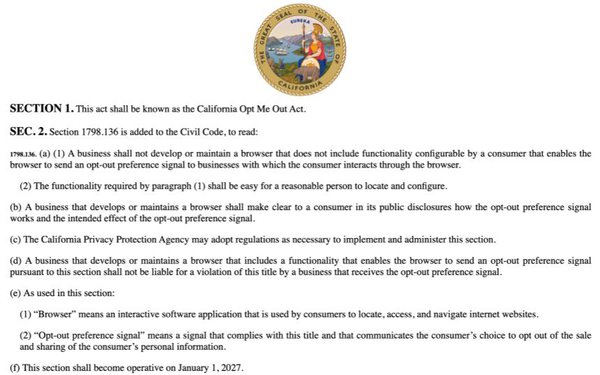
California Governor Gavin Newsom on
Wednesday signed a bill requiring browser developers to offer a tool to enable consumers to easily opt out of online behavioral advertising throughout the web.
Major ad
industry groups opposed the bill, arguing it isn't necessary because consumers currently can access opt-out tools through a variety of mechanisms.
But watchdogs like the
Electronic Privacy Information Center praised Newsom's move,
calling it "a significant step forward for privacy."
AB 566, which was passed last month, specifically prohibits
businesses from “developing or maintaining” a web browser that lacks an opt-out preference signal that sends opt-out requests to every site consumers visit.
advertisement
advertisement
The
best known opt-out preference signal is the Global Privacy Control -- a mechanism created by privacy advocates that essentially sends opt-out signals to every site people visit.
Only some developers -- including Mozilla, Brave and DuckDuckGo -- have built the Global Privacy Control into their browsers. The tool is also available as a browser extension.
Late last month, the Association of National Advertisers, American Association of Advertising Agencies, American Advertising Federation and Digital Advertising Alliance urged Newsom to
veto the bill, arguing it imposes "a broad mandate without delivering meaningful consumer benefits."
California law gives residents the right to opt out of behavioral
advertising, but privacy advocates argue it's cumbersome to do so without access to a tool like the Global Privacy Control.
“It is far too difficult for most people to
use their existing privacy rights,” Matt Schwartz, policy analyst at Consumer Reports, which supports the bill, stated after it was
passed.
“AB 566 will change that by requiring browser vendors to provide a clear and easy-to-use setting that allows consumers to universally opt-out, preventing their
information from being sold or shared with hundreds of third-parties that they have never even heard of," he added.
Absent a browser-based command, consumers who want to reject
behaviorally-targeted ads can click on web companies' opt-out links one-by-one, or can use a tool created by an ad industry group. The ad industry tool allows people to opt out of multiple companies
that belong to industry organizations.
In addition to arguing the bill isn't needed, the ad groups that sought a veto said the measure is inconsistent with California's privacy
law. The groups contend that the text of the statute actually allows companies to either offer opt-out links on their sites or honor opt-out preference signals.
Regulations by
the California Privacy Protection Agency require companies to honor opt-out preference signals, but the ad groups argue that those regulations are based on a misinterpretation of the law's text.